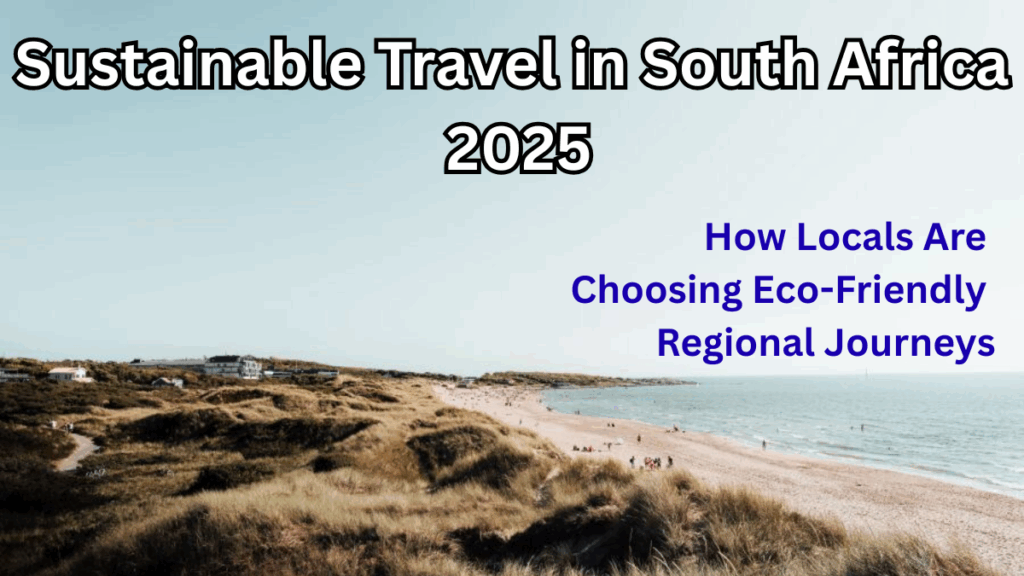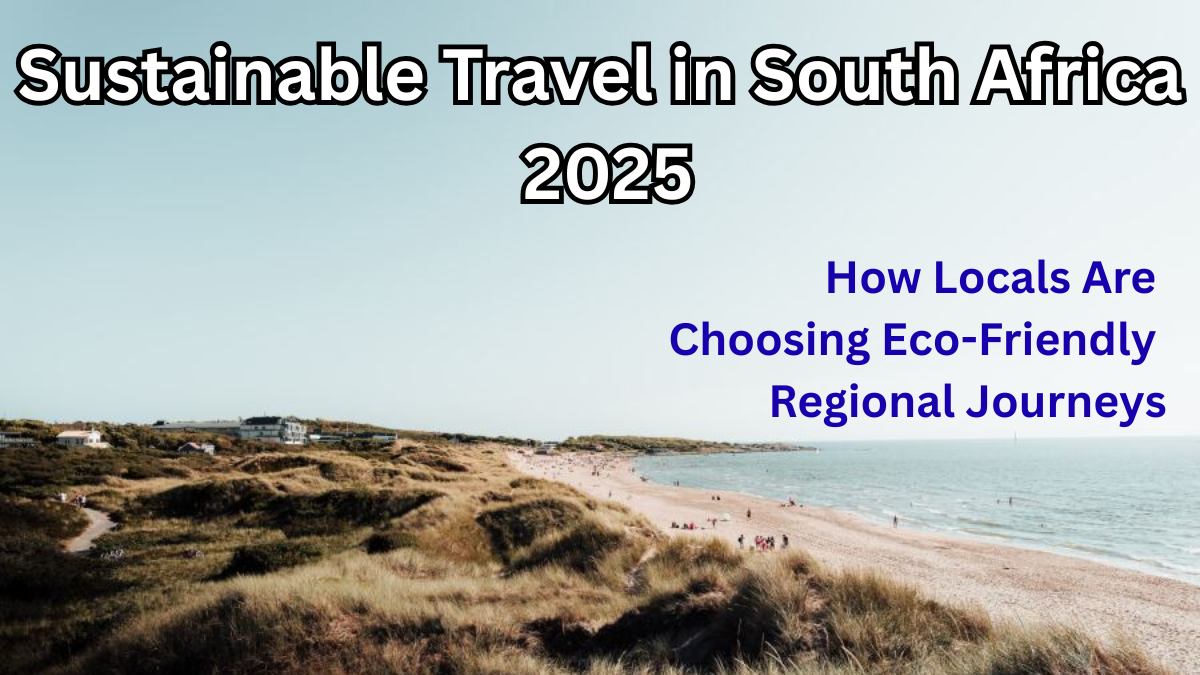In 2025, travel in South Africa is no longer just about reaching a destination—it’s about travelling with meaning. More and more South Africans are embracing mindful journeys that not only enrich their lives but also protect the planet. These shifts are forming the foundation of sustainable travel habits in South Africa, where every trip is an opportunity to support local communities and reduce environmental impact.
This growing consciousness is visible in how people plan their holidays, choose their transportation, and interact with the communities they visit. Let’s explore how this inspiring shift is reshaping travel across the country.

Why Sustainable Travel Matters in South Africa Today
South Africa is one of the most biodiverse countries in the world. From lush forests and dramatic mountains to unique coastlines and cultural landscapes, it holds enormous ecological value. However, that richness is under increasing threat due to climate change, over-tourism, and urbanisation.
Why are South Africans paying more attention now?
-
Prolonged droughts and water shortages are impacting regions like the Western Cape.
-
Rural communities are looking for sustainable sources of income through tourism.
-
Wildlife areas are under pressure from pollution and poaching.
-
Travellers are seeking meaningful, low-impact experiences over traditional tourism.
These realities are inspiring South Africans to adopt sustainable travel habits that prioritise environmental preservation and community well-being.
The Rise of Local Eco-Tourism
A remarkable trend emerging in 2025 is the Local Eco-Tourism Uptick. With fewer people flying abroad and more choosing to explore their home country, domestic travel is seeing a surge—especially to off-the-grid, nature-rich destinations.
This rise in local tourism isn’t just a post-pandemic rebound; it’s a deliberate and mindful movement.
Top Eco-Friendly Travel Destinations in 2025
| Destination | Province | Notable Eco-Features |
|---|---|---|
| Cederberg Mountains | Western Cape | Off-grid stone cottages, conservation-led hikes |
| iSimangaliso Wetland | KwaZulu-Natal | UNESCO site, eco-marine safaris, community-run accommodations |
| Magoebaskloof Forests | Limpopo | Organic markets, canopy walks, bird sanctuaries |
| Drakensberg Range | Free State/KZN | Eco-lodges, guided heritage trails, zero-waste tourism |
| Prince Albert & Karoo | Northern Cape | Solar-powered guesthouses, desert conservation projects |
The Local Eco-Tourism Uptick has encouraged travellers to look beyond traditional holiday spots and discover hidden gems that are both stunning and sustainable.
Everyday Sustainable Travel Habits Gaining Ground
Travellers across South Africa are now taking small, intentional steps that make a significant difference. These habits not only reduce environmental harm but also create more meaningful connections with the places visited.
Examples of Responsible Travel Behavior:
-
Staying in eco-certified accommodations that use renewable energy and recycling systems
-
Shopping locally and choosing handmade crafts, organic produce, and community-led services
-
Avoiding single-use plastics by bringing reusable water bottles, utensils, and bags
-
Using green transport like trains, buses, or shared rides instead of short-haul flights
-
Joining clean-up or conservation efforts during travel
These practices are becoming a part of everyday life for many South Africans, especially among Gen Z and millennial travellers leading the sustainability wave.
Transport Trends: Greener Ways to Move Around
How you travel is just as important as where you go. In 2025, more South Africans are making eco-conscious transportation choices to reduce their carbon footprint while exploring the country.
Transport Options and Their Eco Ratings:
| Transport Mode | Eco-Friendliness | Why It’s Trending in 2025 |
|---|---|---|
| Electric Vehicles (EVs) | ⭐⭐⭐⭐⭐ | EV rentals and public charging stations are expanding |
| Public Buses | ⭐⭐⭐⭐ | Affordable, reliable, and widely accessible |
| Passenger Trains | ⭐⭐⭐⭐ | Relaxing, scenic, and eco-friendly alternative to flying |
| Carpooling Apps | ⭐⭐⭐⭐ | A cost-effective and social way to travel sustainably |
| Short-Haul Flights | ⭐⭐ | Used less often as people opt for lower-impact transport |
With more public awareness and government incentives, green transport is becoming both easier and more appealing for domestic travellers.
Community-Led Tourism: Empowering Through Inclusion
One of the most impactful aspects of the Local Eco-Tourism Uptick is the rise in community-driven travel experiences. These initiatives put local people at the centre of tourism, giving them ownership and income while offering travellers a more authentic and respectful experience.
Benefits of Community-Led Travel:
-
Income generation for households through homestays, food, and guiding
-
Preservation of culture through language, dance, music, and storytelling
-
Environmental stewardship encouraged through shared values and education
-
Deep, human connections between visitors and local communities
By participating in community-led tours, workshops, or conservation efforts, travellers are not just visiting—they’re contributing to something meaningful.
The Bigger Picture – Travel as a Lifestyle Shift
What makes sustainable travel habits in South Africa so significant in 2025 is how seamlessly they are becoming part of mainstream culture. It’s not just for hardcore eco-travellers anymore.
From families to solo adventurers and student groups, South Africans are embracing:
-
Staycations that explore hidden regional treasures
-
Eco-conscious planning that balances comfort and sustainability
-
Minimal-impact practices like slow travel, digital detoxes, and voluntary simplicity
Sustainable travel has become more than a trend—it’s a mindset. It’s about rethinking how we engage with the world around us, how we spend our money, and how we leave places better than we found them.
Frequently Asked Questions
Q1: What are sustainable travel habits in South Africa?
Sustainable travel habits involve choosing eco-friendly transportation, staying in green-certified accommodations, reducing waste, and supporting local businesses and communities. It’s about being a responsible traveller.
Q2: Why is there a local eco-tourism uptick in 2025?
The rise in domestic travel stems from a growing awareness of climate change, a desire to support local economies, and a renewed interest in discovering South Africa’s rich natural and cultural heritage.
Q3: How can I find sustainable places to stay in South Africa?
Look for eco-certifications such as Fair Trade Tourism, Green Leaf Eco Standard, or EarthCheck. Many booking platforms now highlight properties with verified sustainable practices.
Q4: Is eco-tourism expensive?
Not always. While some eco-lodges may have higher rates due to sustainable infrastructure, many community-run homestays and eco-options are budget-friendly. Plus, you often save by avoiding wasteful spending.
Final Thoughts
The year 2025 marks a transformative moment for travel in South Africa. With sustainable travel habits taking hold and the local eco-tourism uptick growing stronger, South Africans are proving that you don’t have to go far to have a fulfilling journey. All it takes is intention—choosing to travel in a way that protects nature, uplifts communities, and enriches your own perspective.
Click here to learn more
